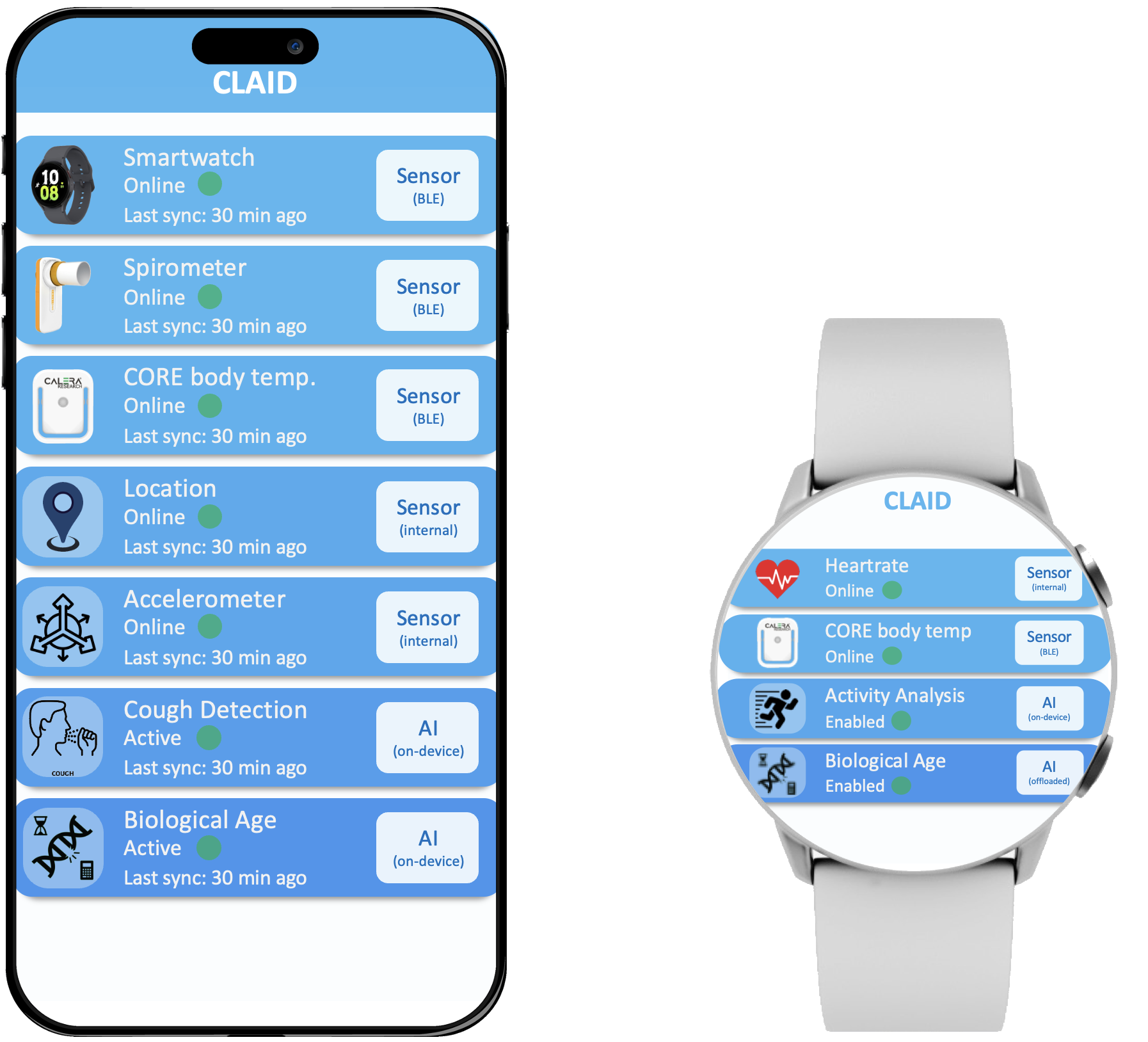
The Solution for Edge AI Integration and Sensor Data Collection
CLAID is an open-source initiative to develop, validate and share AI models, digital biomarkers and healthcare applications. Our goal is to transfer research findings from the lab into the real-world. We invite researchers, clinicians and developers to use and contribute packages and to participate in our community.
| AI models | Integrated devices | |||||||
|---|---|---|---|---|---|---|---|---|
|
Operating Systems
|
Cough Detection | Biological Age | Activity Recognition | Embedded Python ML | Galaxy Watch | Bosch Vivatmo | GreenTEG CORE | Polar |
| Android, WearOS | ✓ | ✓ | ✓ | ✓ | ✓ | ✓ | ✓ | ✓ |
| iOS | ✓ | ✓ | ✓ | -- | ✓ | ✓ | ✓ | ✓ |
| Linux, macOS | ✓ | ✓ | ✓ | ✓ | -- | -- | -- | -- |
What you can do with CLAID ¶
Machine Learning Everywhere
Machine Learning
CLAID provides support for Python on Android and WearOS, allowing to use many of the existing machine- and deep learning frameworks on mobile devices. You can inject existing machine-learning code into any CLAID App without having to create an App yourself. Additionally, CLAID provides support for hardware acceleration for certain models, e.g. via TensorFlow.

Digital Biomarkers
Digital Biomarkers
CLAID offers a novel approach to Data Collection on Mobile Devices. Isolated and loosely-coupled Sensor Modules can collect data from sensors either available directly on the device, or paired via an external bluetooth connection. Data serialization and synchronization are configurable and handled automatically, even if you add your own custom Sensor Modules.
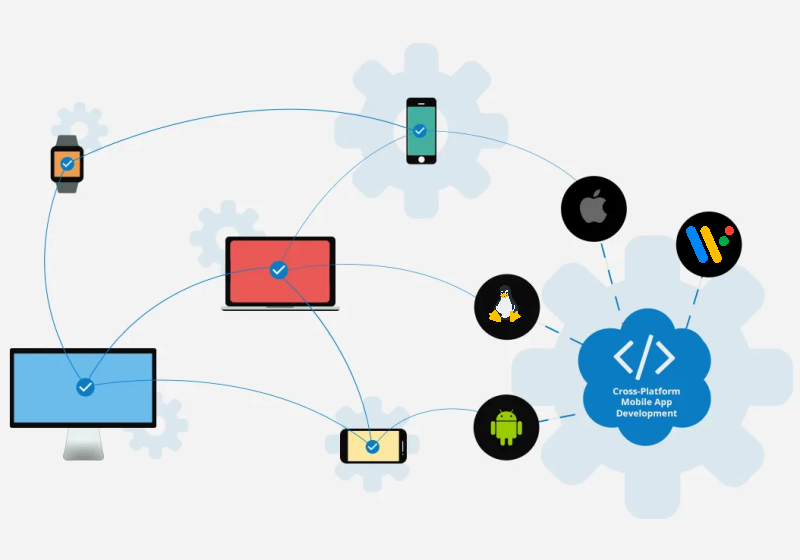
Cross-platformDistributed Computing
Distributed Computing
By leveraging transparent computing, CLAID enables communication across different operating systems (Android, WearOS, iOS, Linux, macOS) and programming languages in realtime to distribute computational tasks.
Highlights ¶

Model deployment and Data Collection
CLAID aims to streamline the process of ML-model deployment and Data Collection by offering a unified approach. If you utilize mobile devices for data collection of any kind (videos, images, external sensors) to train your machine learning solutions, CLAID allows you to seamlessly repurpose Data Collection Applications to integrate your trained models, thereby enabling practical implementation.
We provide common Modules for Data collection and deployment of ML solutions, e.g., via TensorFlowLite. You can combine and reuse Modules for your applications by writing configuration files. Existing Modules are extensible and we provide Tutorials and Templates for you to implement your own Modules.
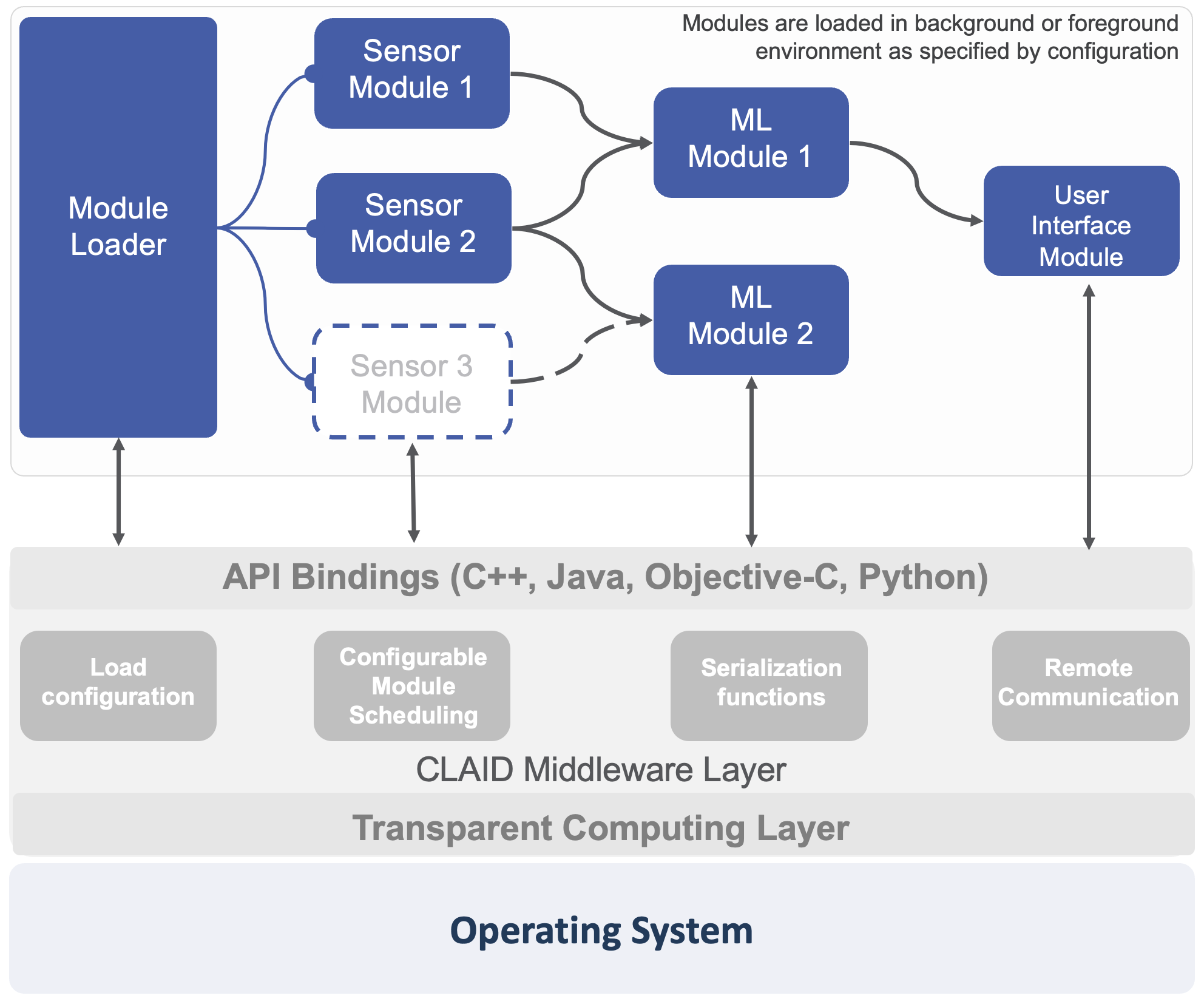
Extensible API to integrate new Sensors and Modules
In the rapidly growing field of mobile devies, it is almost impossible to keep up with all OS or API updates or even with new devices on the market. Hence, we provide a flexible and extensible API to facilitate integration for various scenarios.
We want to make the integration of new sensors or custom APIs more straightforward, by providing common functionalities for scheduling data collection, serialization, data storage and synchronization. We also provide methods to automatically run Modules in the background and to keep the device from entering doze mode. Check out our examples and tutorials.
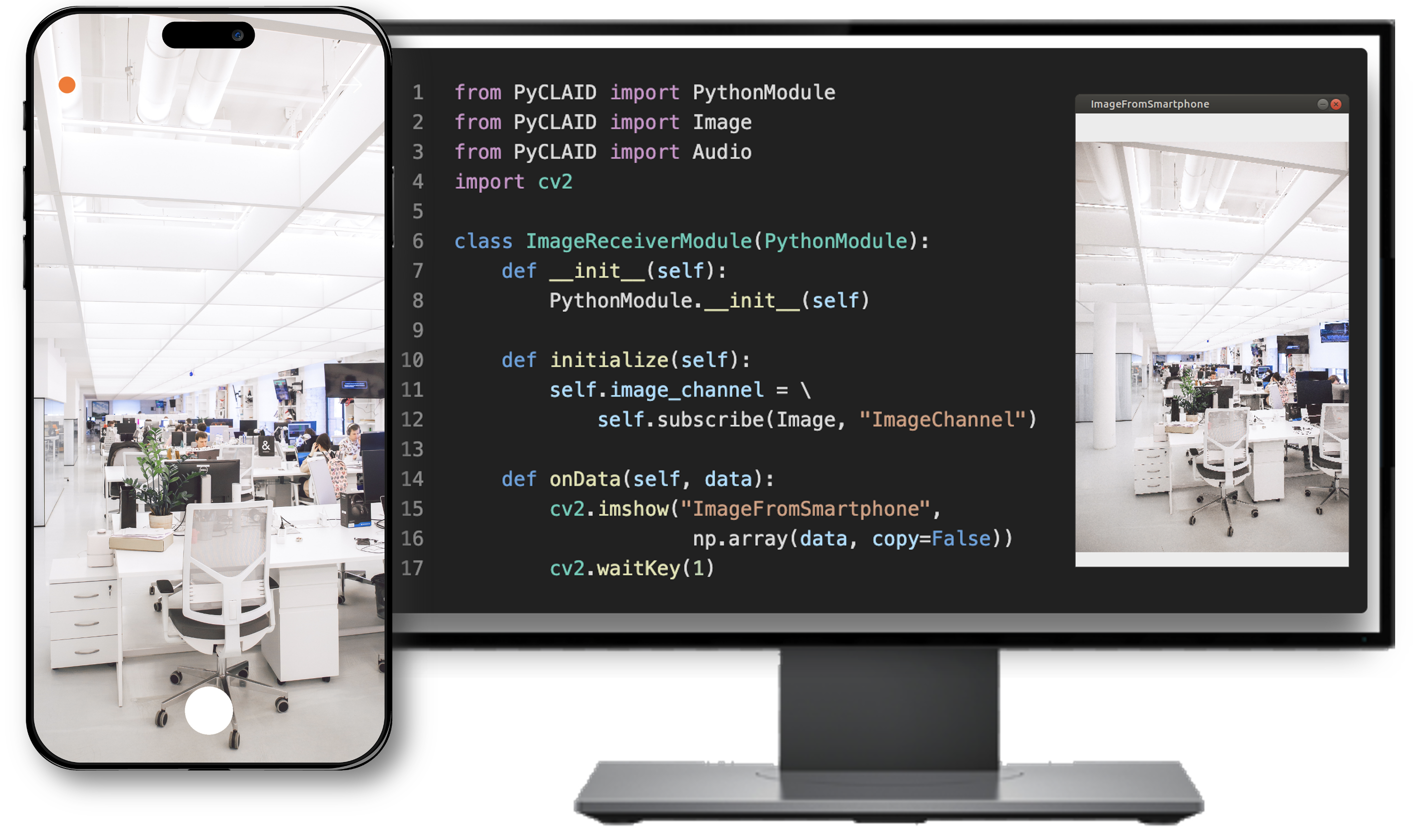
Send and Stream Data via transparently connected Modules across Devices
Using principles of transparent computing, with CLAID you can connect devices such as Servers, PCs, Smartphones and Wearables (based on WearOS). Separate devices running CLAID are logically integrated into one system, allowing Modules running anywhere to communicate with each other, even across network boundaries.
With this approach, you can stream and send data across Devices and even Programming Languages. For example, it is possible for Modules running on a Server written in Python to receive Data from a Connected Smartphone. Among others, you can stream images from the Smartphone Camera and receive them directly as NumPy Array in Python to manipulate or visualize them.
Learn more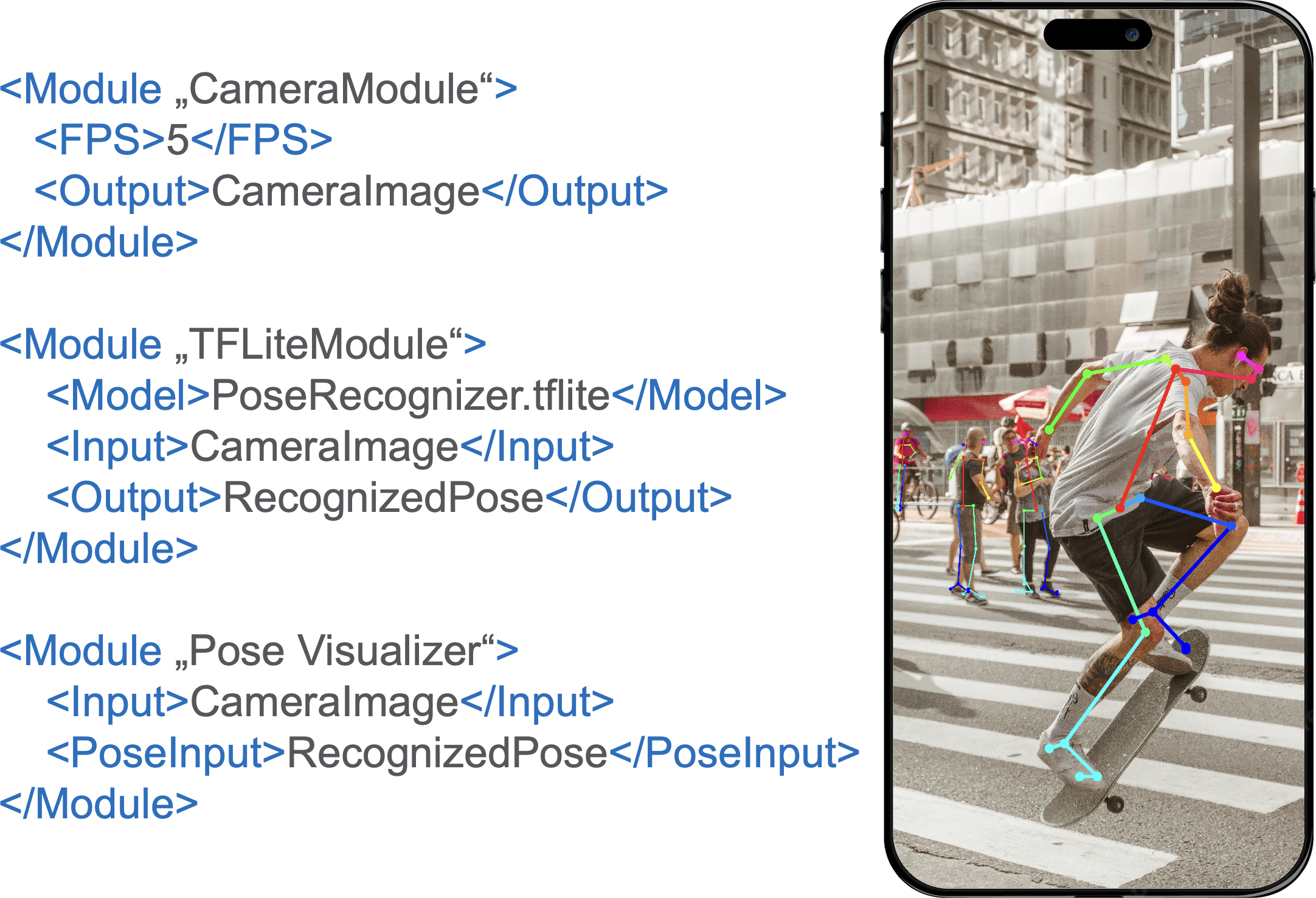
Build your Applications using expressive Configurations
The concept of decoupled Modules allows to write scalable and adaptable applications. The communication between Modules happens via Channels. As each Module implemented with CLAID is a independent entity, you can load and combine them via configuration files. Additionally, each Module can define properties, that you can specify via the configuration aswell.
We provide ready-to-use Modules via separate packages, that you can install and load via the configuration. For example, this allows you to instantiate ML models available in the TensorFlowLite format simply by providing a path to the Model on your device.
Learn moreCentre for Digital Health Interventions ¶
The Centre for Digital Health Interventions (CDHI) is a joint initiative of several Instituations and Departments spanning across ETH Zurich, the University of Zurich, the Singapore-ETH Centre, and the University of St. Gallen. We are keen to see a world in which tailored digital healthcare solutions are effective and available to those in need. We would like to contribute to a clearer understanding of how non-communicable diseases can be prevented and better managed with the help of digital health applications and wearable devices. We believe that our applied research and prototype interventions offer the potential of bridging an application gap between theoretical research and care solutions. We value learning from industry and healthcare and enjoy working together towards shared goals.
Together, we build digital solutions for the benefit of patients!